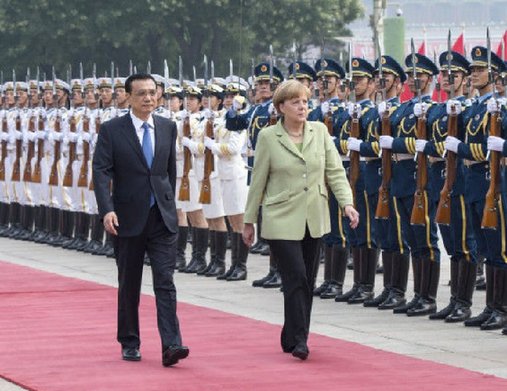China-Germany 'Industry 4.0' takes effect
- By Zhao Zhilin
 0 Comment(s)
0 Comment(s) Print
Print E-mail People's Daily, October 16, 2014
E-mail People's Daily, October 16, 2014
|
|
|
Li Keqiang will visit Germany for the second time since he became Chinese Premier in March 2013, as part of his upcoming visit to Germany, Russia, Italy and the UN Food and Agricultural Organization headquarters from October 9 to 15. [Source: CNS] |
The "Industry 4.0" concept has appeared in a China-Germany cooperation guideline released on the 3rd governmental consultation between China and Germany, providing a new era for in-depth cooperation between China and Germany.
This concept was first put forward at the Hannover Messe in Germany in 2013. Germany has adopted this idea as its national strategy, aiming to support research, development and innovation of revolutionary new technology.
Responding to technological innovation in Germany, China as the factory of the world has proposed the "Made in China 2025" strategy to promote integration of information and industrialization. This ambitious plan shows China's modesty. China has treated Germany, whose production industry has a worldwide reputation, as a paragon.
After the 2013 Hannover Messe, experts from the Chinese Academy of Engineering and State-owned Assets Supervision and Administration Commission of the State Council conducted a colloquium on "German Industry 4.0". Furthermore, based on guidelines of "Made in China 2025", Chinese Ministry of Industry and Information Technology held a seminar aiming to strengthen the manufacturing industry in China.
It is noticeable that this plan no longer emphasizes a 5-year deadline but extends its time horizon to 2025; it also focuses on medium to long-term high-end designs. China is adopting a more pragmatic approach in the course of stepping up to advanced level in the global industrial chain.
Taking opportunity of Chinese Premier Li Keqiang's state visit to Germany, China and Germany have made a breakthrough on the "Industry 4.0" proposition in transferring from individual management to in-depth cooperation.
Minister Miao Xu of Industry and Information Technology noted in Germany that Chancellor Merkel welcomed China's participation in the German strategy in March. It can easily been seen that there is a "win-win" potential for Sino-German industrial development and innovation.
Compared with the stages of 1.0, 2.0 and 3.0, "Industry 4.0" is more innovative and progressive. Formerly technological cooperation between the major powers was dominated by pragmatism and centered on items such as precision machine tools and core components.
Two elements of the cooperation should be noted.
Firstly, both countries deemed that it companies should have the freedom to promote progress in cooperation, while it is the role of the two governments to provide policy support for this progress.
Secondly, the worldwide success of the strategy relies on international rules and standards. The two countries will cooperate closely on issues of standards and "Industry 4.0" will be incorporated into the Sino-German standardization cooperation committee.
Boundary and rules are the two key elements for market economy appropriate operation. It is a positive sign that Sino-German cooperation has been upgraded. To some extent, the determination to upgrade China's economy is as important as the USD 18.1 billion trade bills signed between the two countries.







Go to Forum >>0 Comment(s)